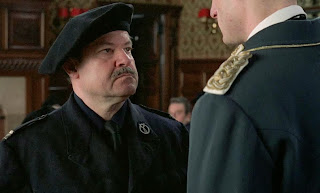During second world war the monk running a boarding school for upper-class kids hides Jewish kids.
This highly personal movie is very touching and manages to avoid all the pitfalls of being overly emotional. Music and editing are very subdued and carefully used to underline situations. This makes the story ring true (which it was) and gives the viewer good time to settle into the universe that these kids live in.
There are many quite complicated scenes and I was interested in one particular: When Jean gets invited on parent's day by the mother of his new best friend into a posh restaurant. In that very restaurant there are Nazis at one side of the room and an elderly Jew sitting on the other side. The table of the family is right inbetween. Many things about France during the war are told during this scene, I'll just try and focus on camera placement.
The focus shifts twice in the scene: From the family table to the French Jew's table (who I have been told wears the red dot, which means he is a member of the French Legion of Honor) and then again to the Nazi's table on the other side. The elegance with which this setup was solved is quite impressive. The waiter starts and ends the scene, giving light and pouring wine.
I've tried to construct a diagram, where the camera was placed and how it jumps unobtrusively from one table to the next. Some of the takes are incredibly long, and the closeups are pretty short and most of them are simple reactions. I didn't consider every single cut, but to get a general idea where the camera goes to introduce people and "hot spots" in the room. (animated gif)
This highly personal movie is very touching and manages to avoid all the pitfalls of being overly emotional. Music and editing are very subdued and carefully used to underline situations. This makes the story ring true (which it was) and gives the viewer good time to settle into the universe that these kids live in.
There are many quite complicated scenes and I was interested in one particular: When Jean gets invited on parent's day by the mother of his new best friend into a posh restaurant. In that very restaurant there are Nazis at one side of the room and an elderly Jew sitting on the other side. The table of the family is right inbetween. Many things about France during the war are told during this scene, I'll just try and focus on camera placement.
The focus shifts twice in the scene: From the family table to the French Jew's table (who I have been told wears the red dot, which means he is a member of the French Legion of Honor) and then again to the Nazi's table on the other side. The elegance with which this setup was solved is quite impressive. The waiter starts and ends the scene, giving light and pouring wine.
I've tried to construct a diagram, where the camera was placed and how it jumps unobtrusively from one table to the next. Some of the takes are incredibly long, and the closeups are pretty short and most of them are simple reactions. I didn't consider every single cut, but to get a general idea where the camera goes to introduce people and "hot spots" in the room. (animated gif)









Kommentare